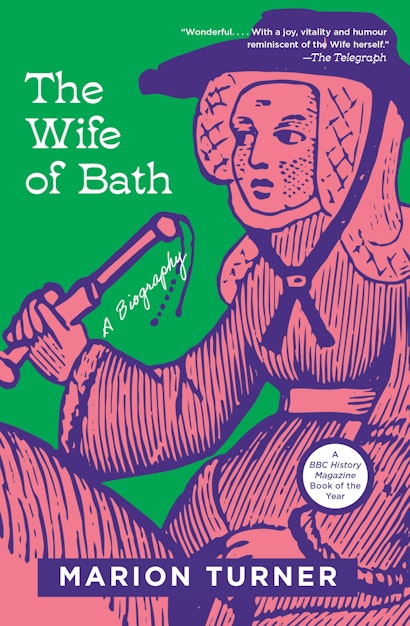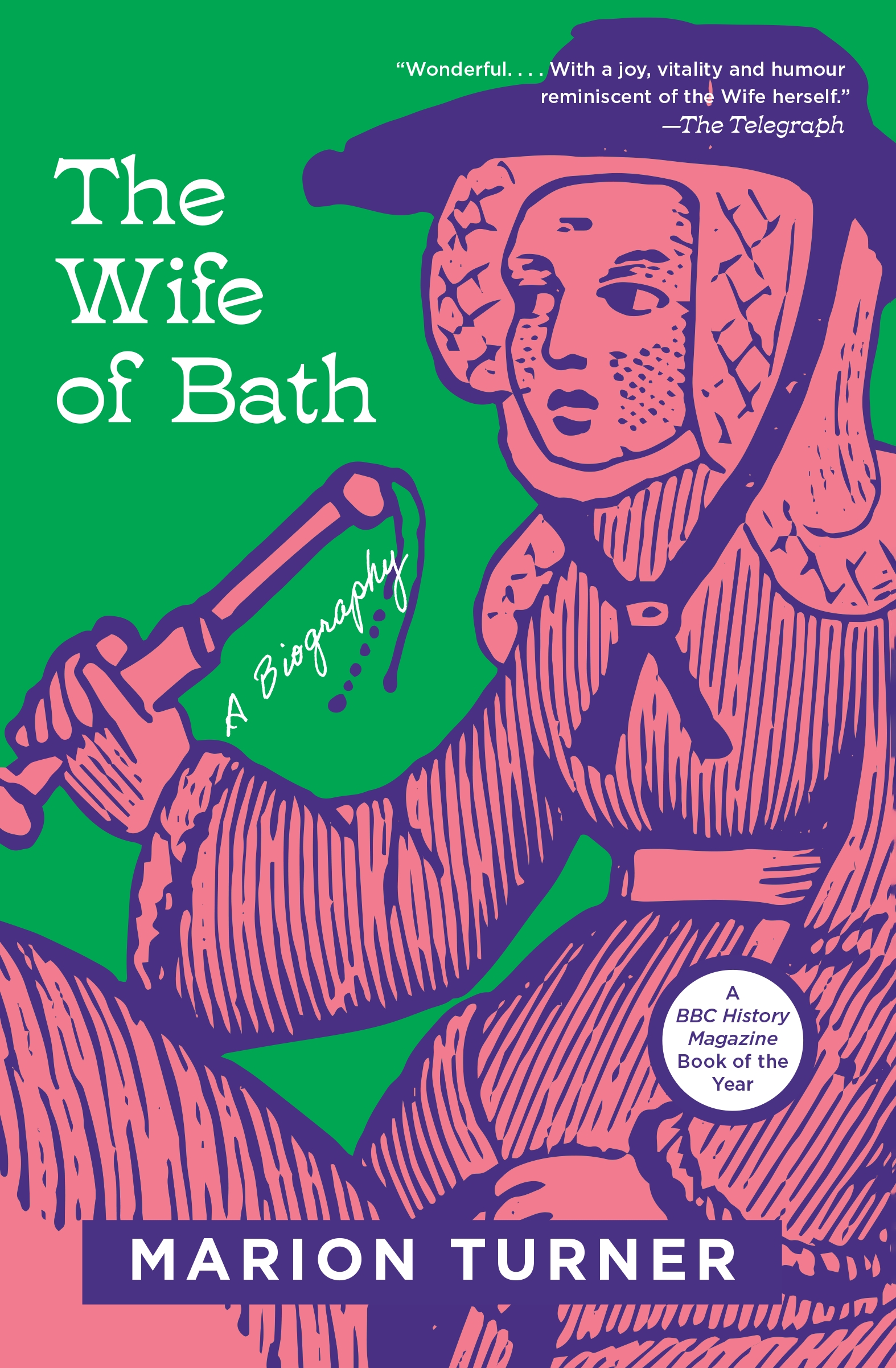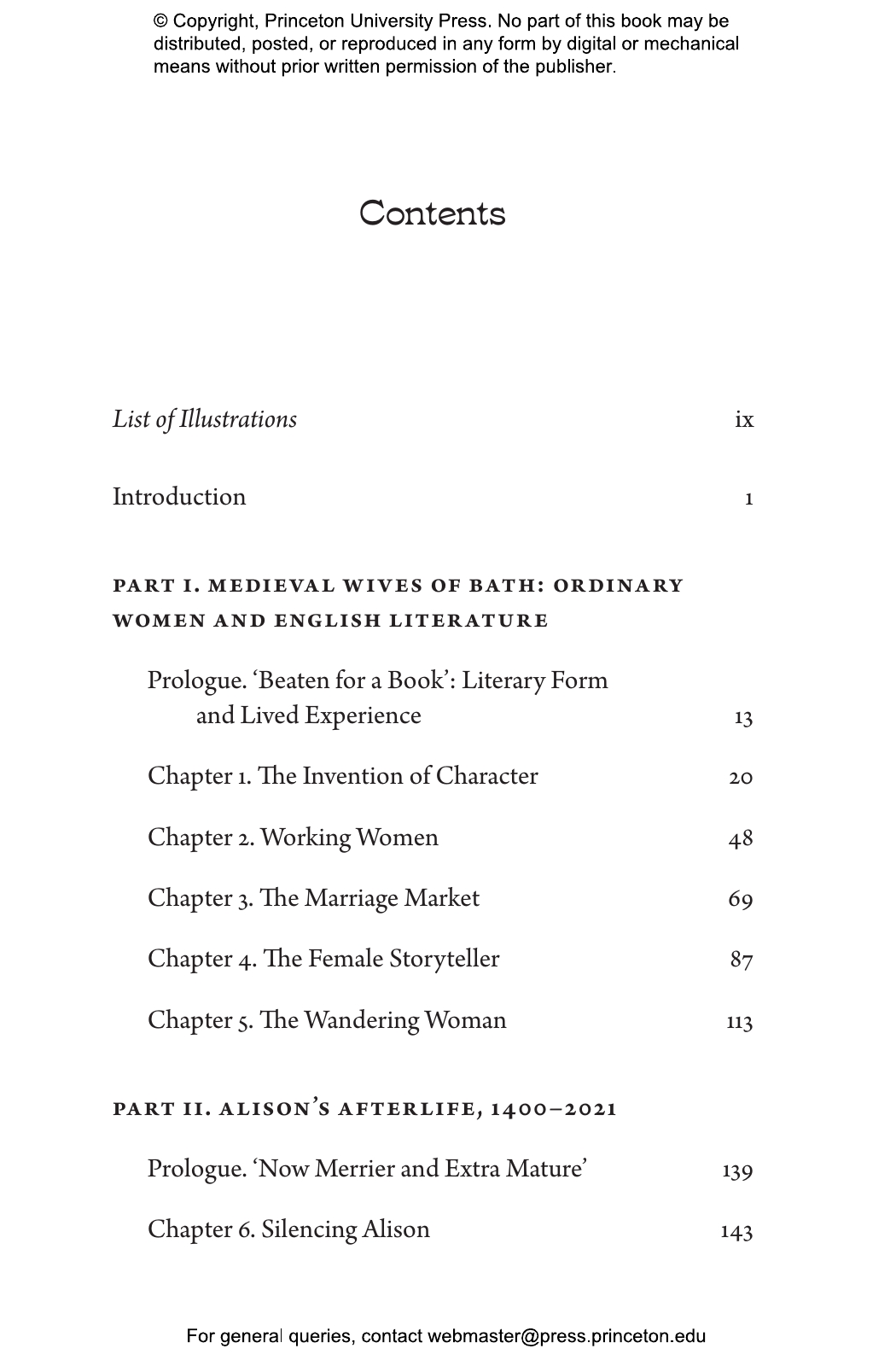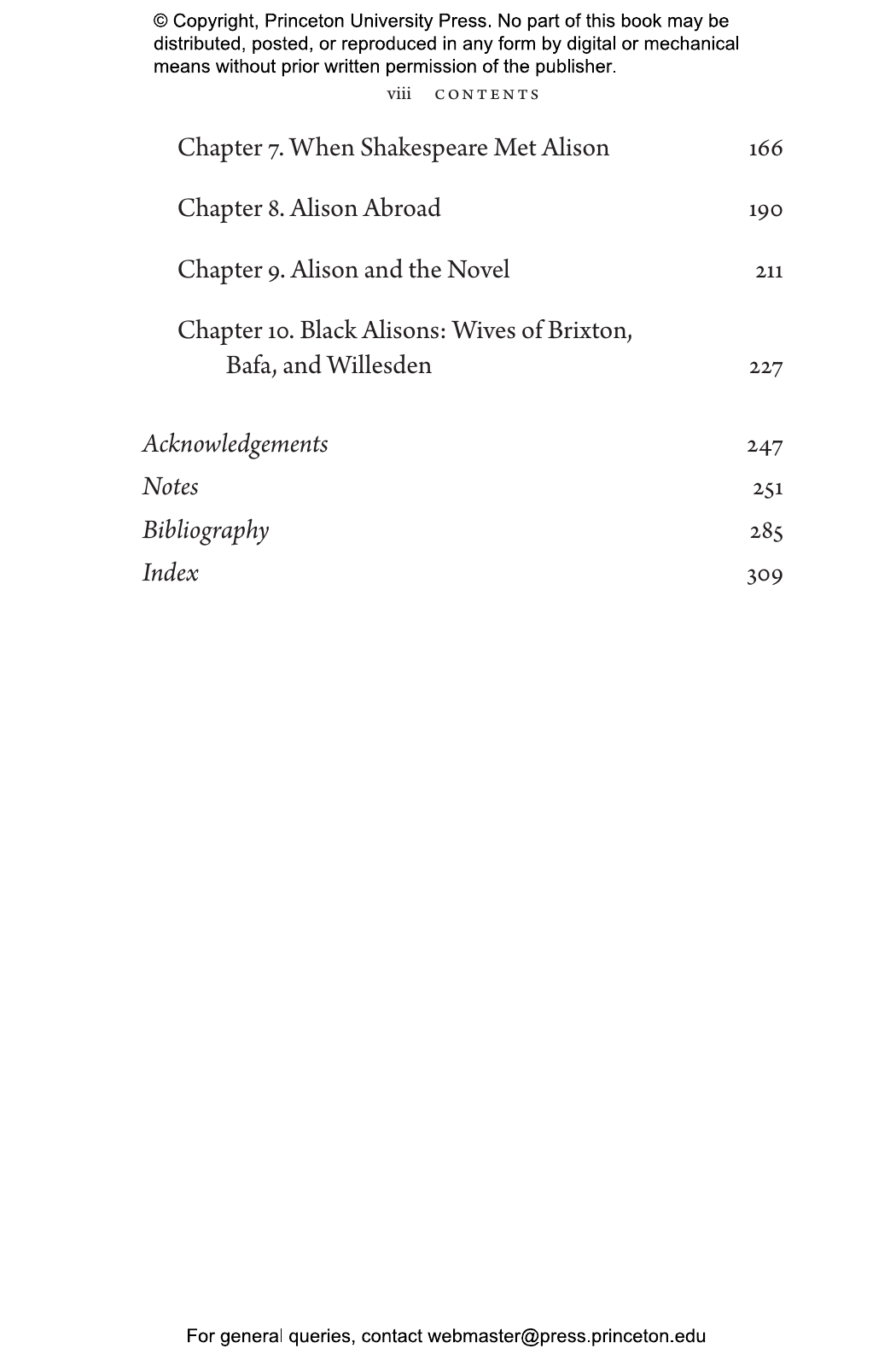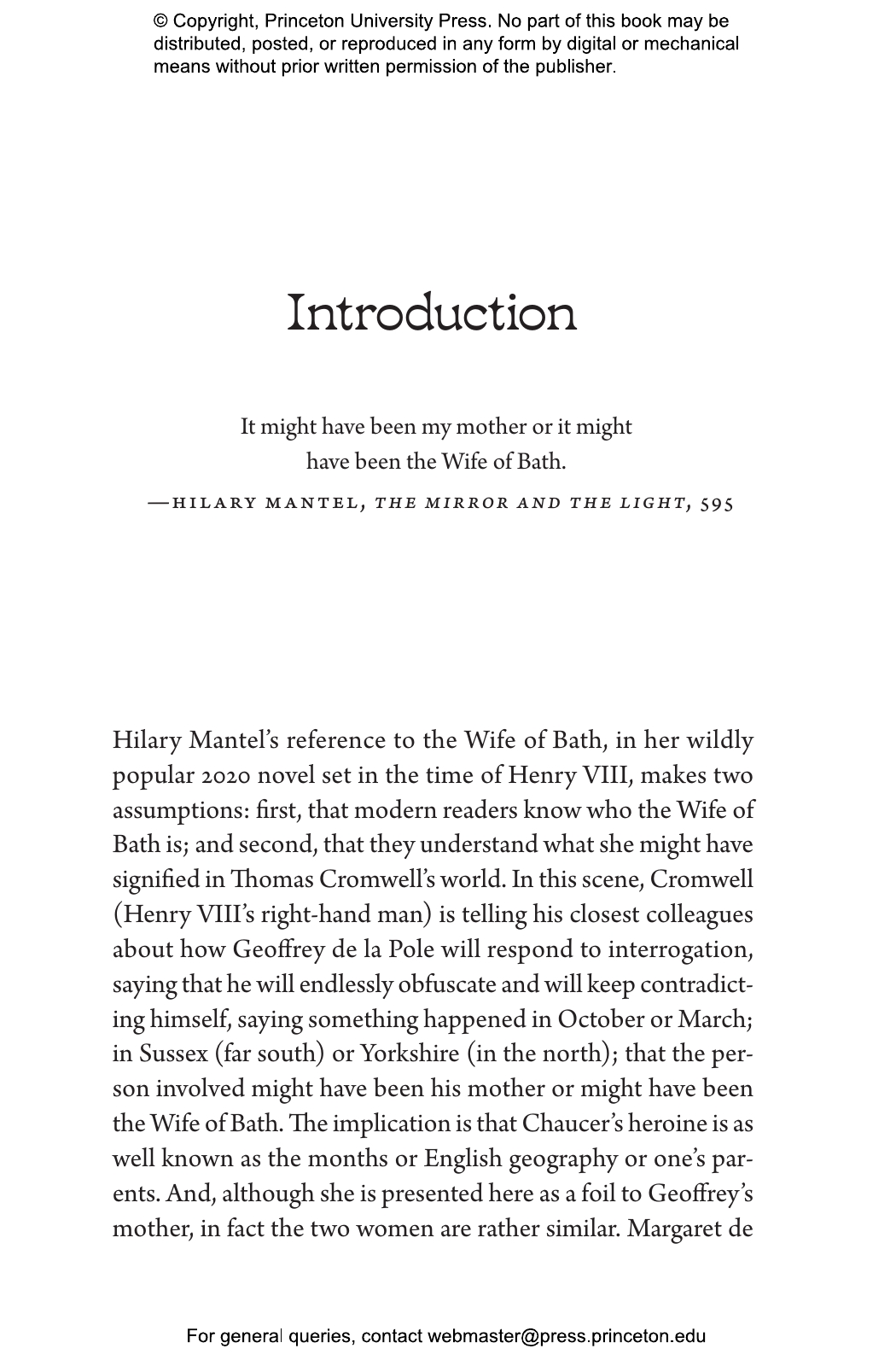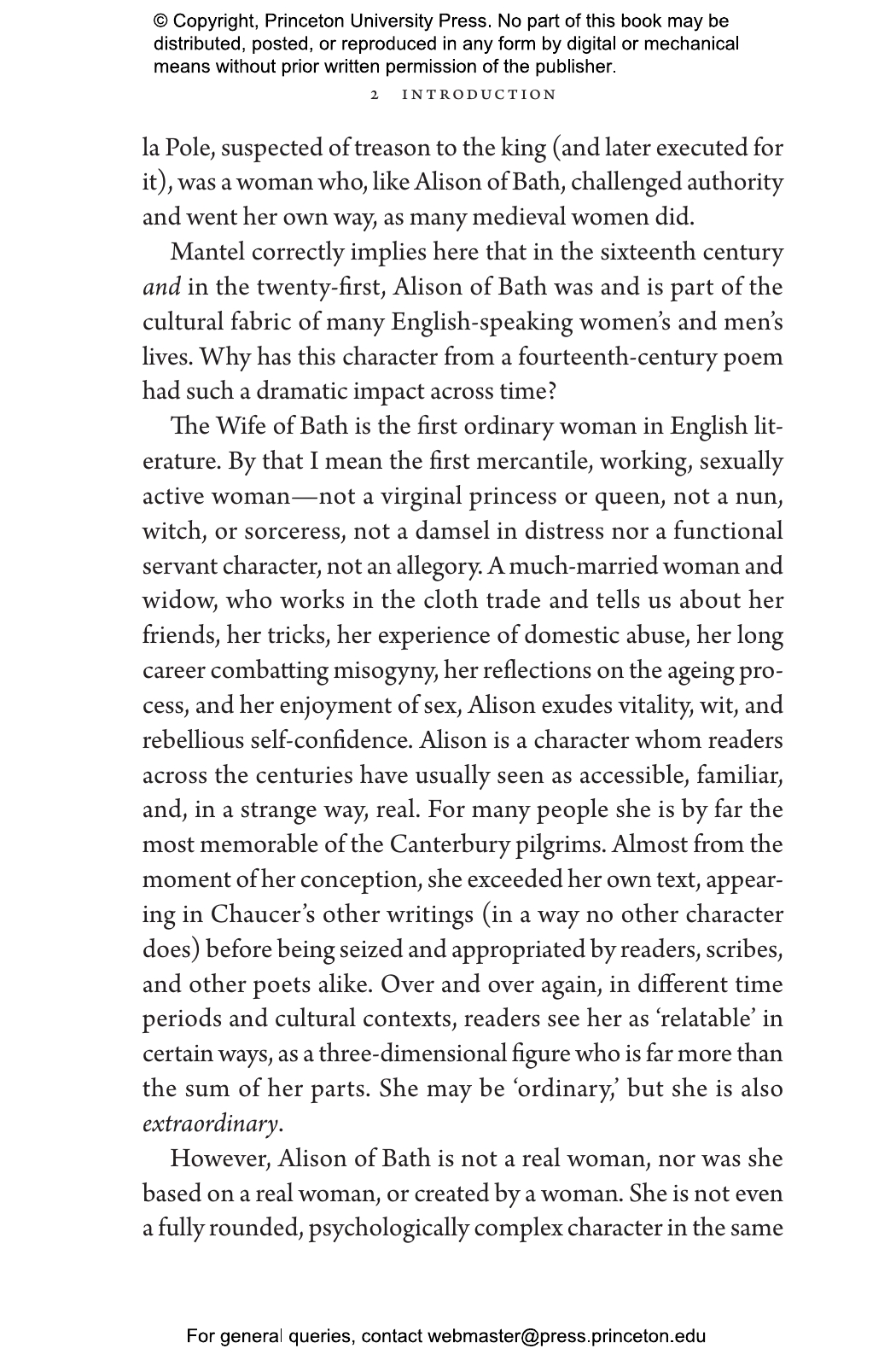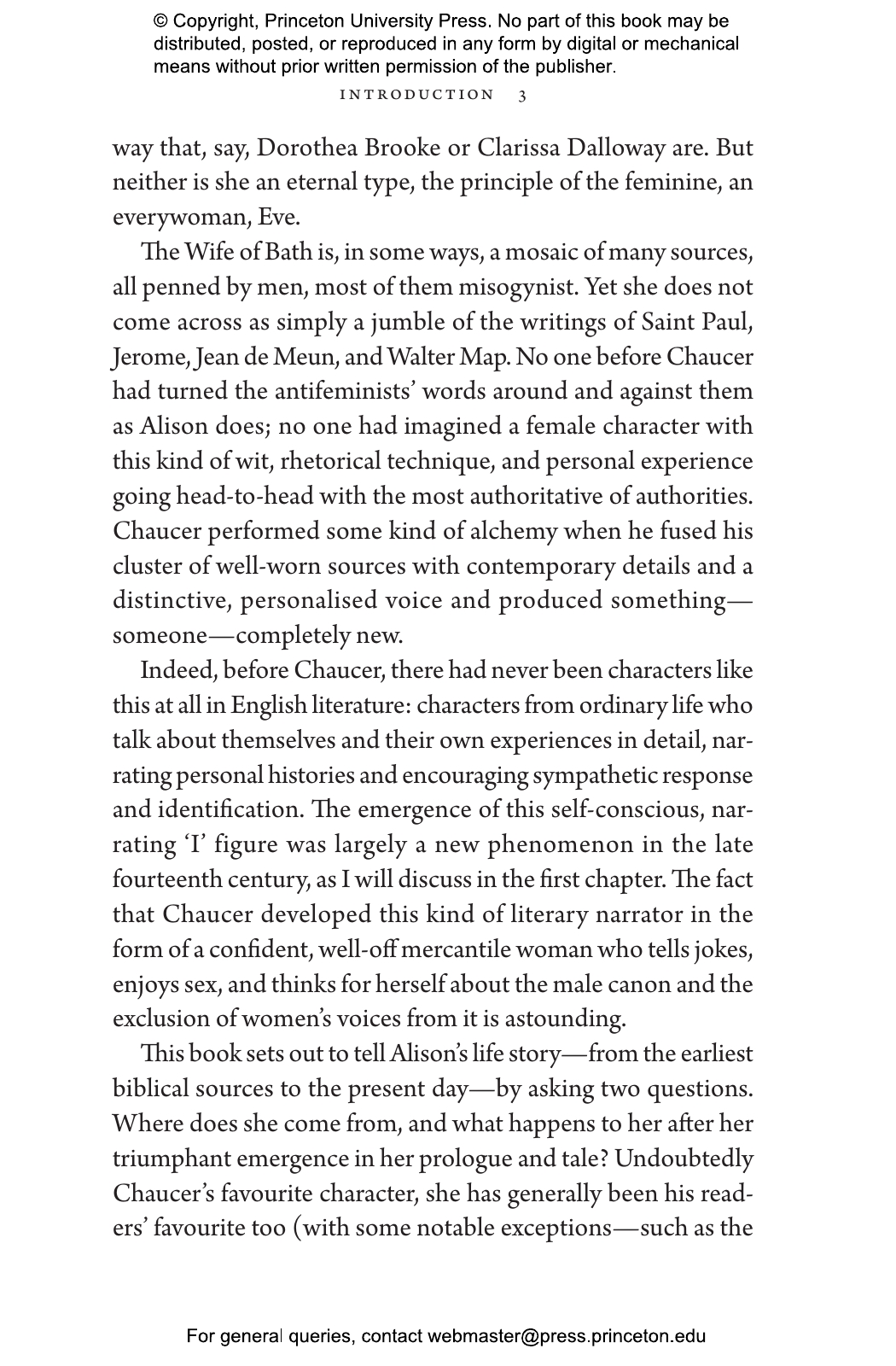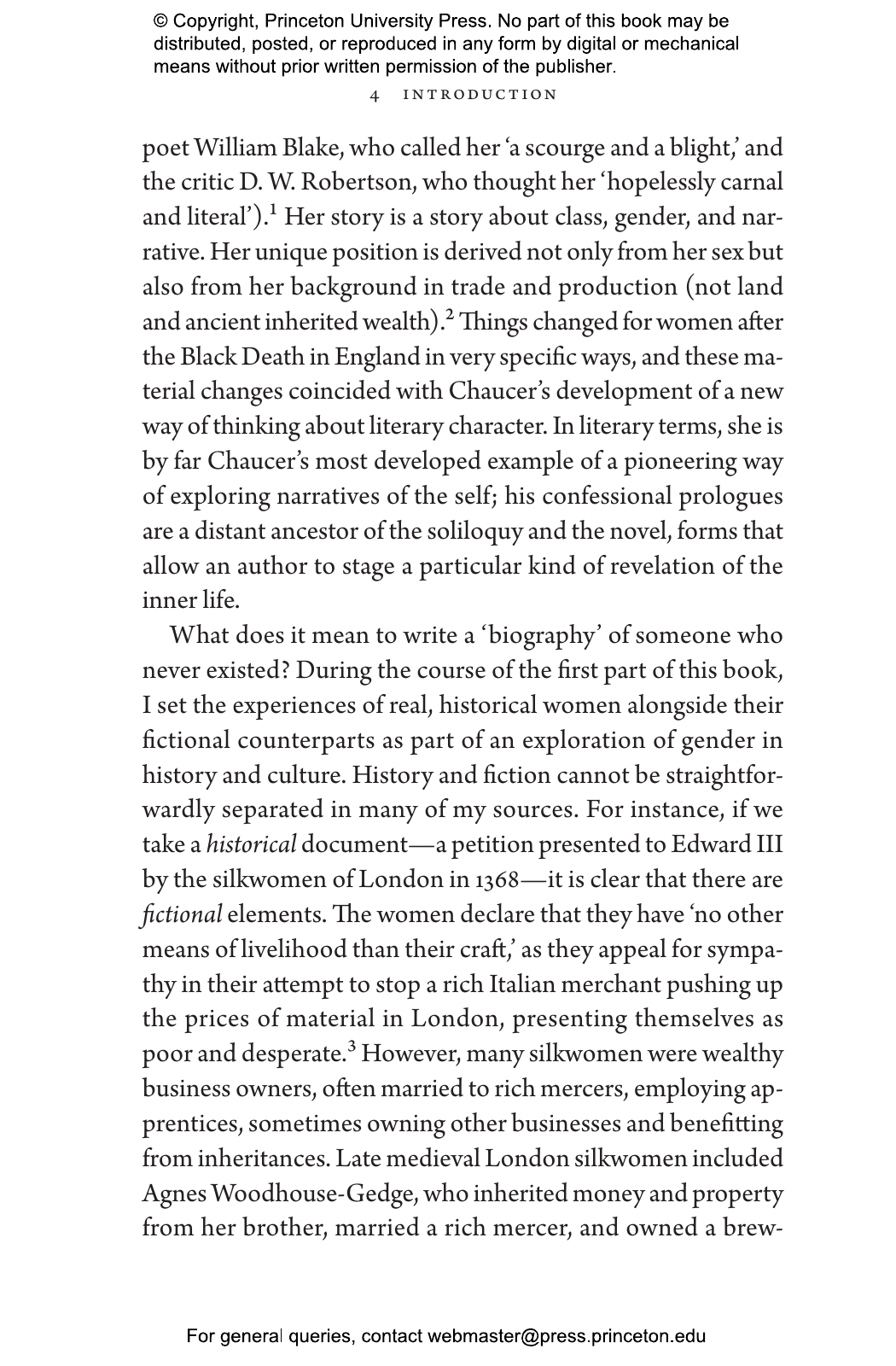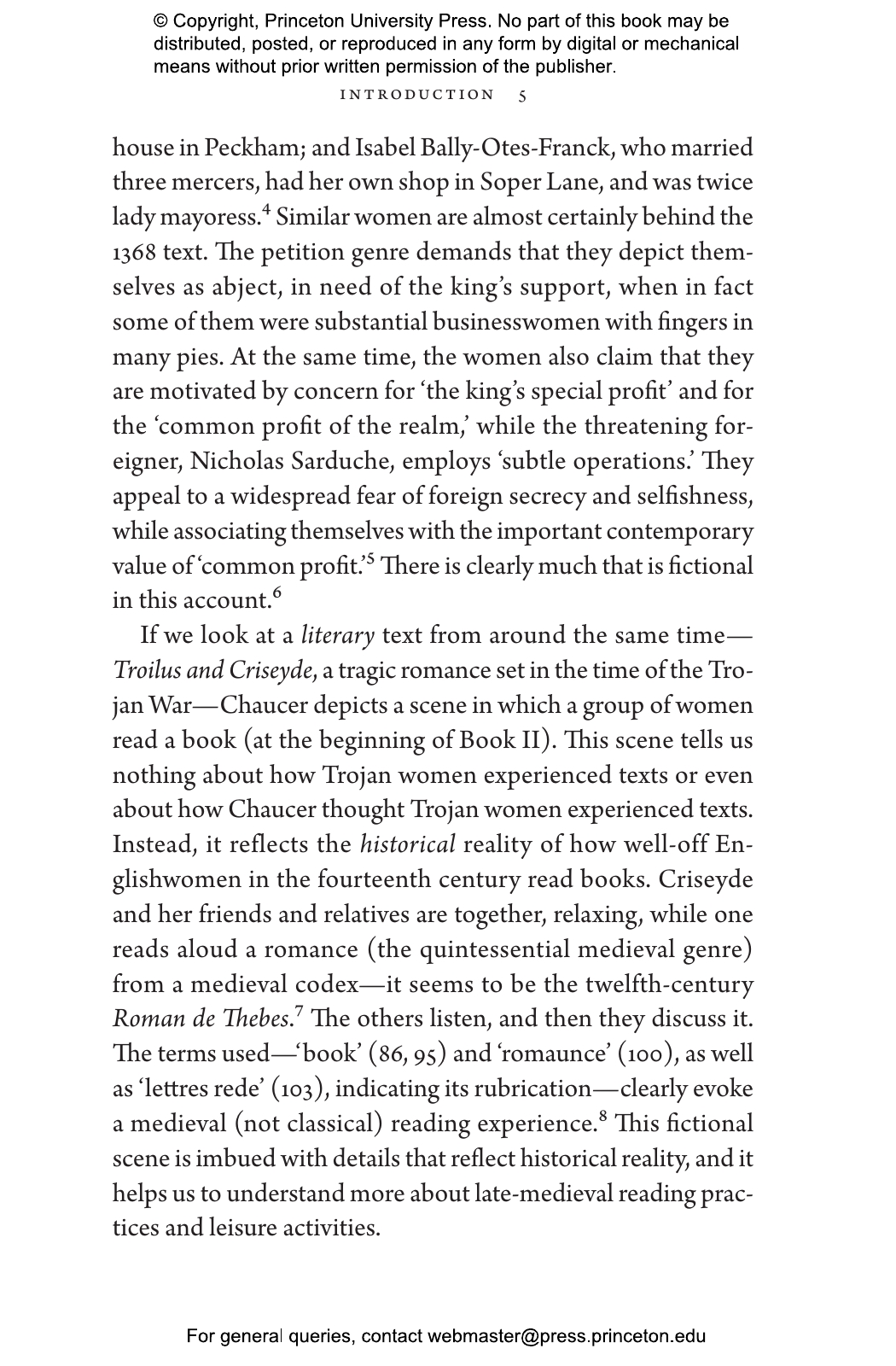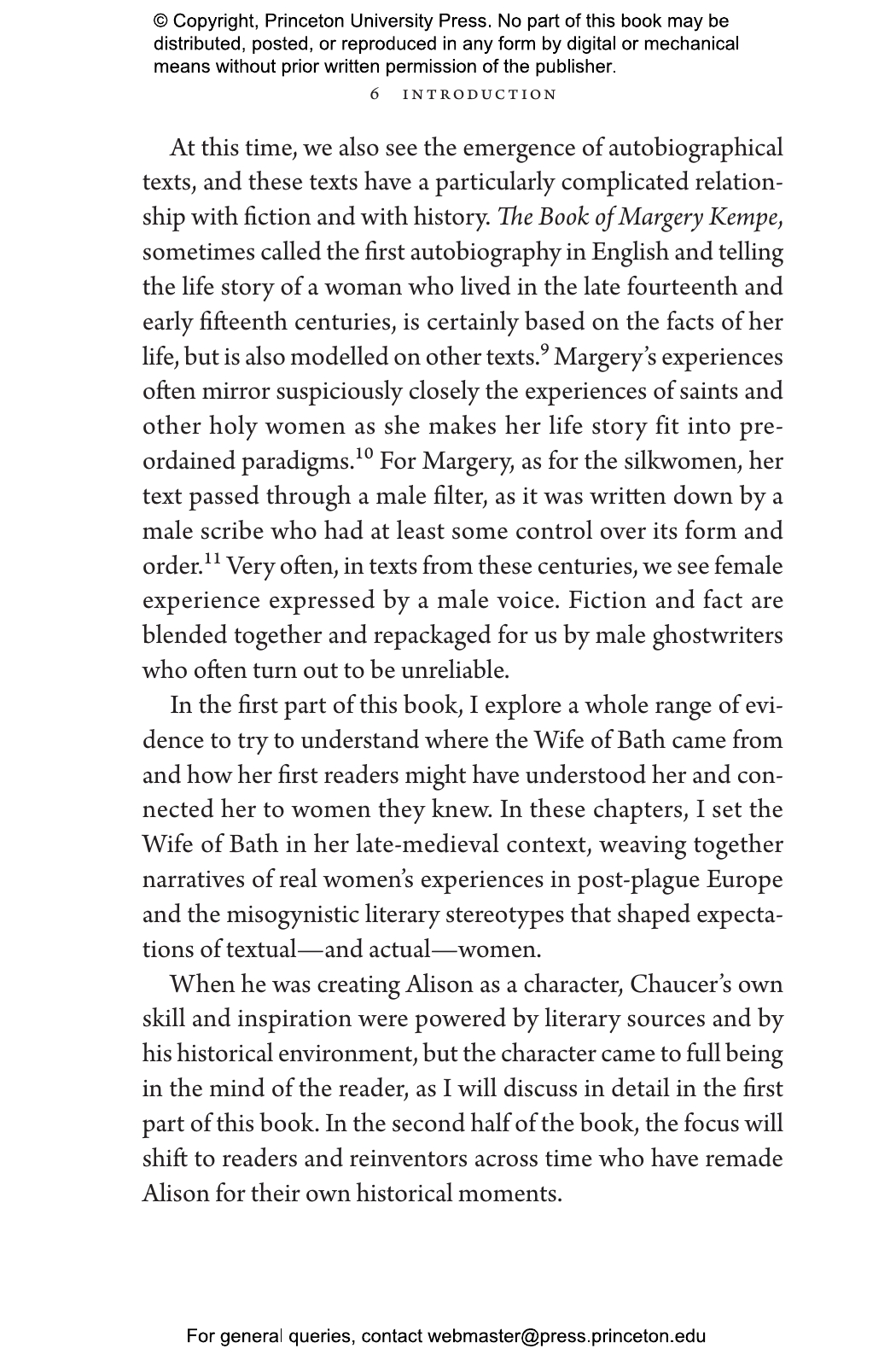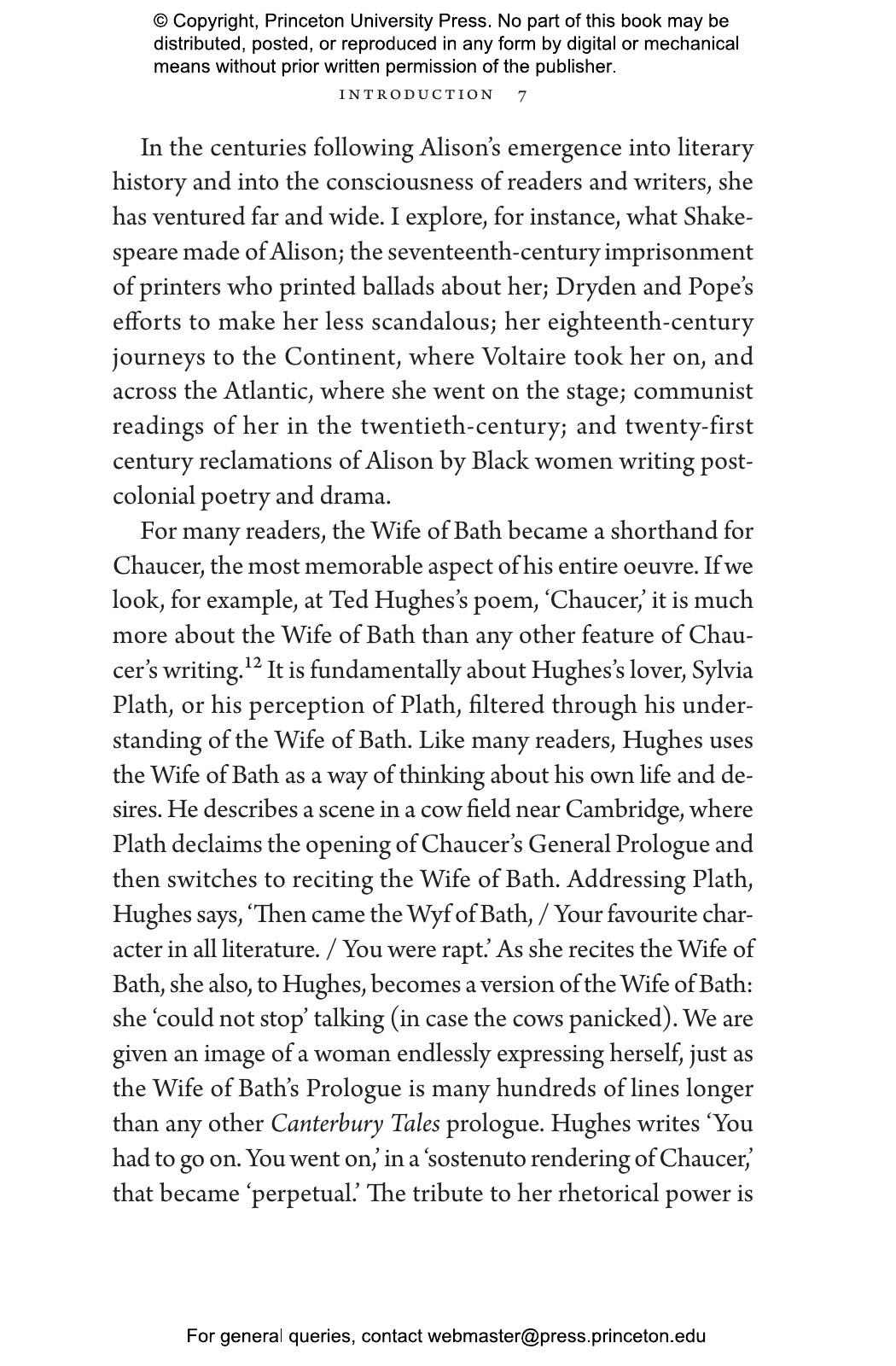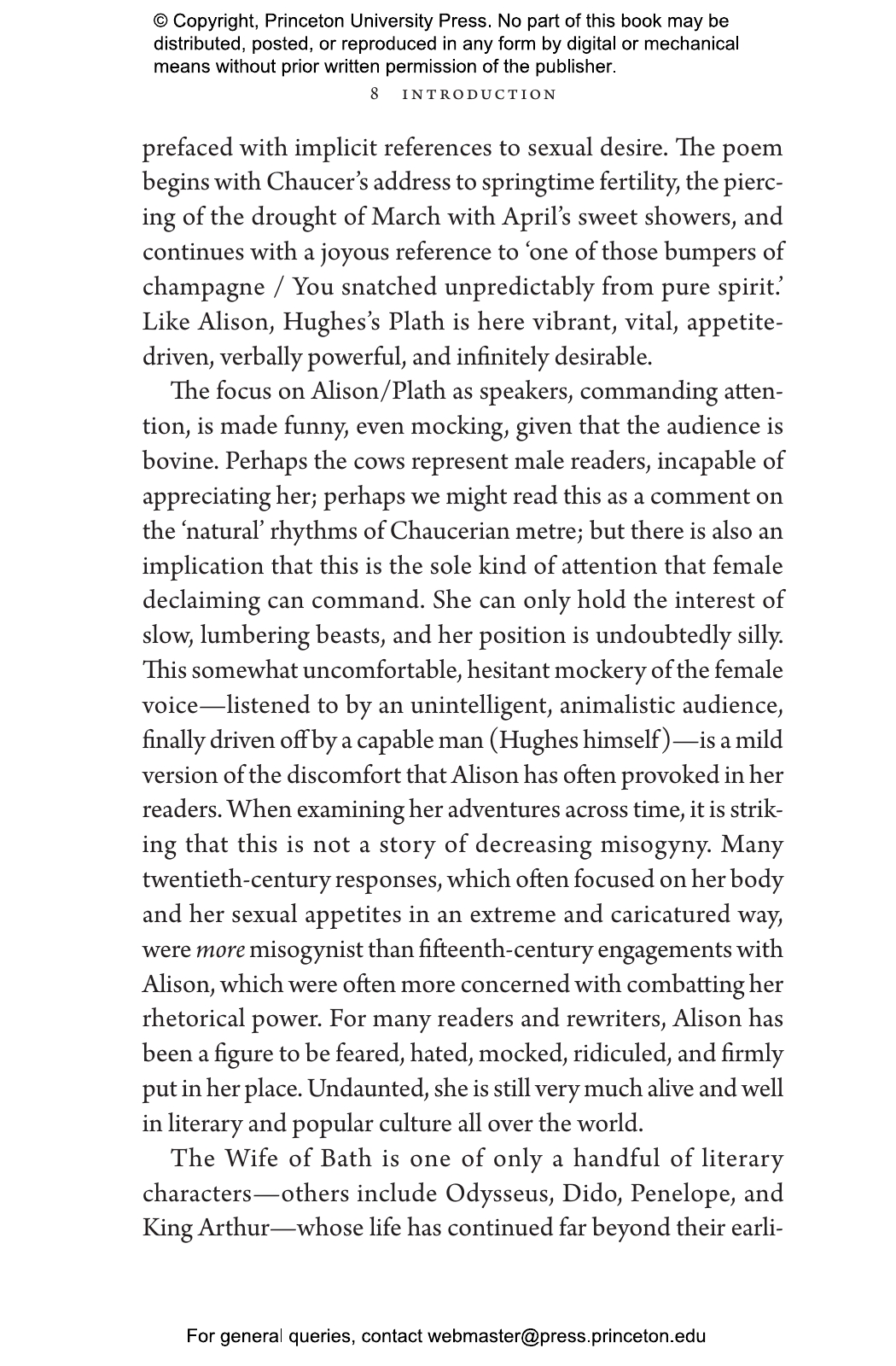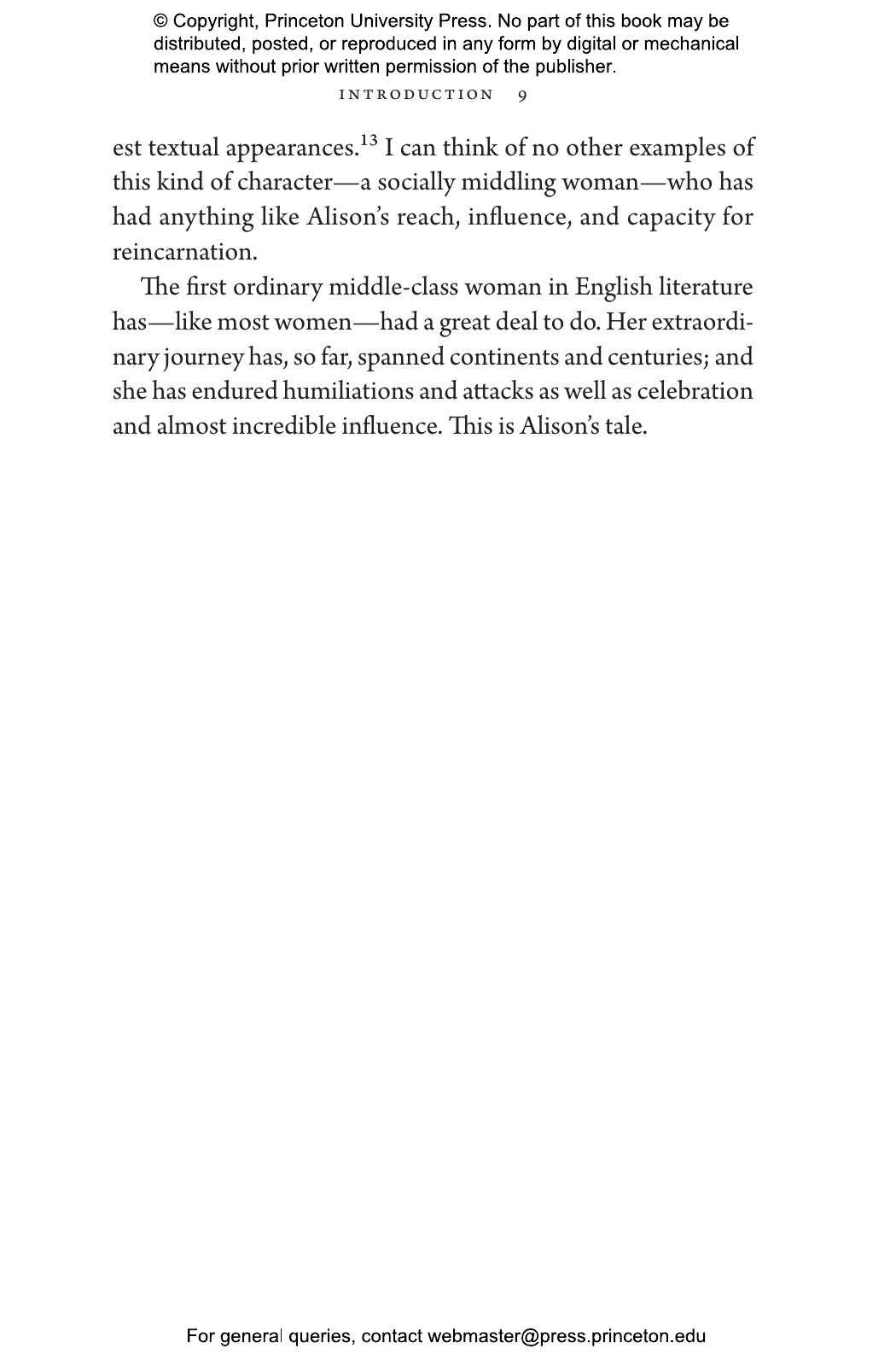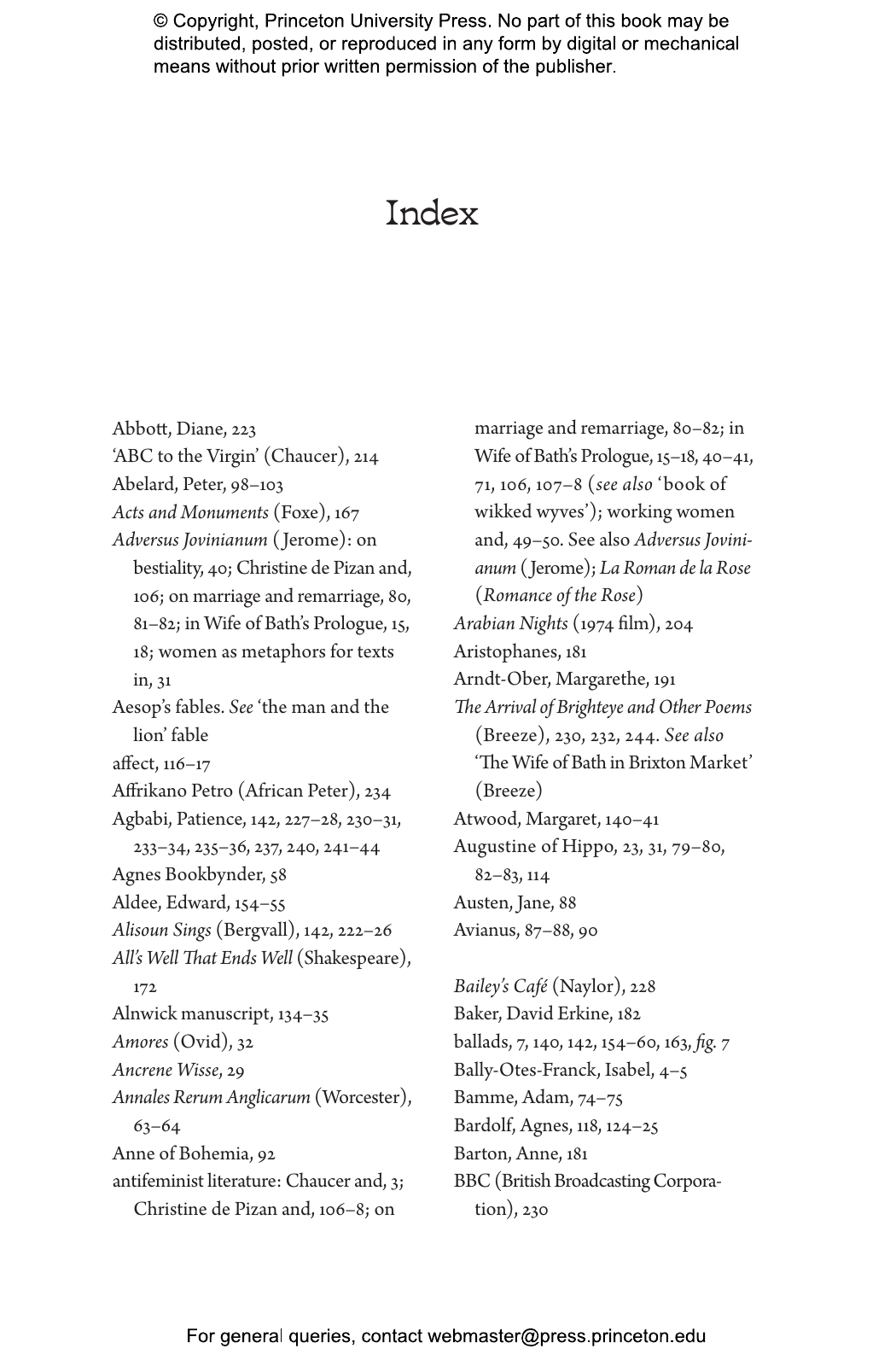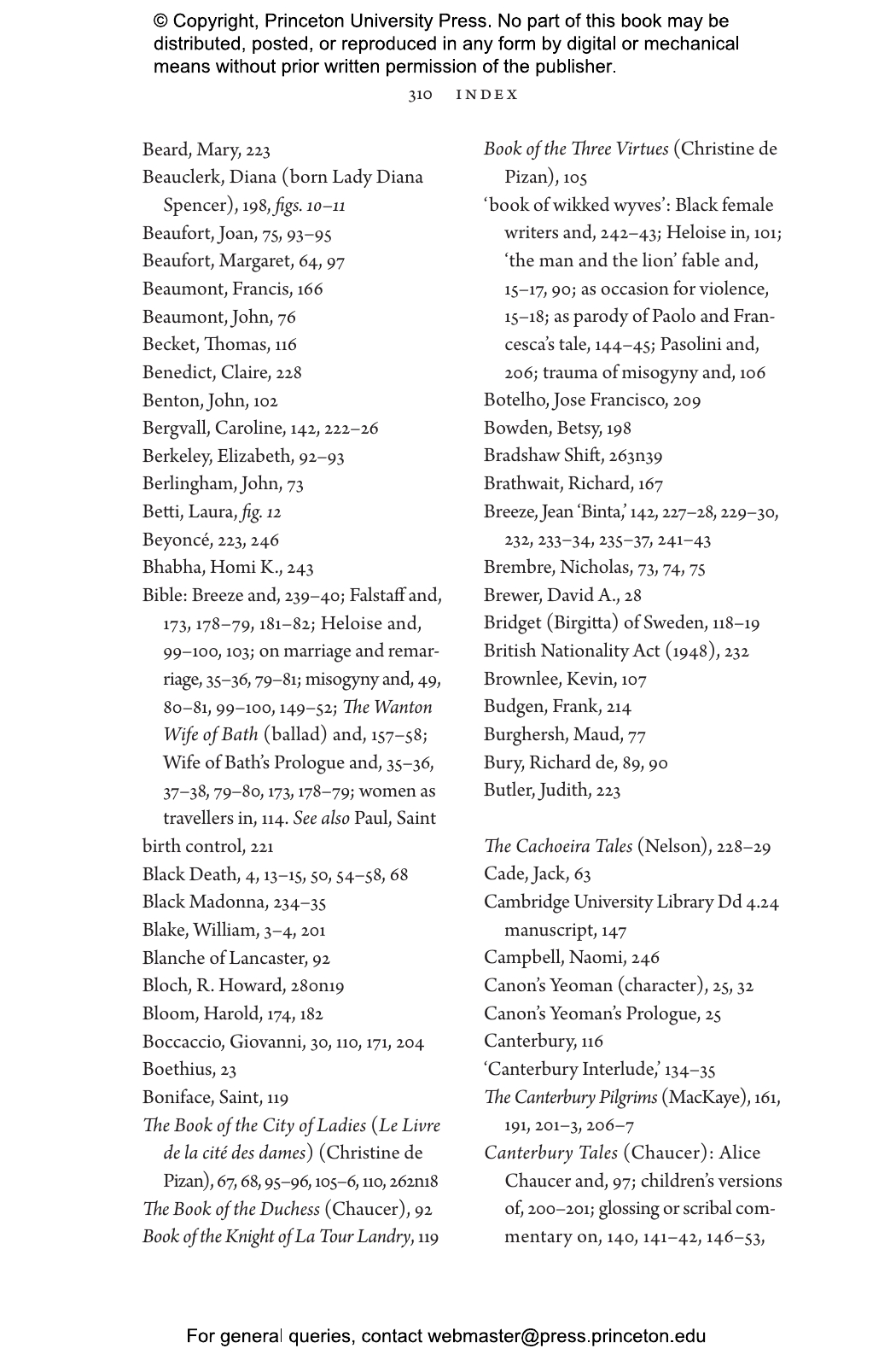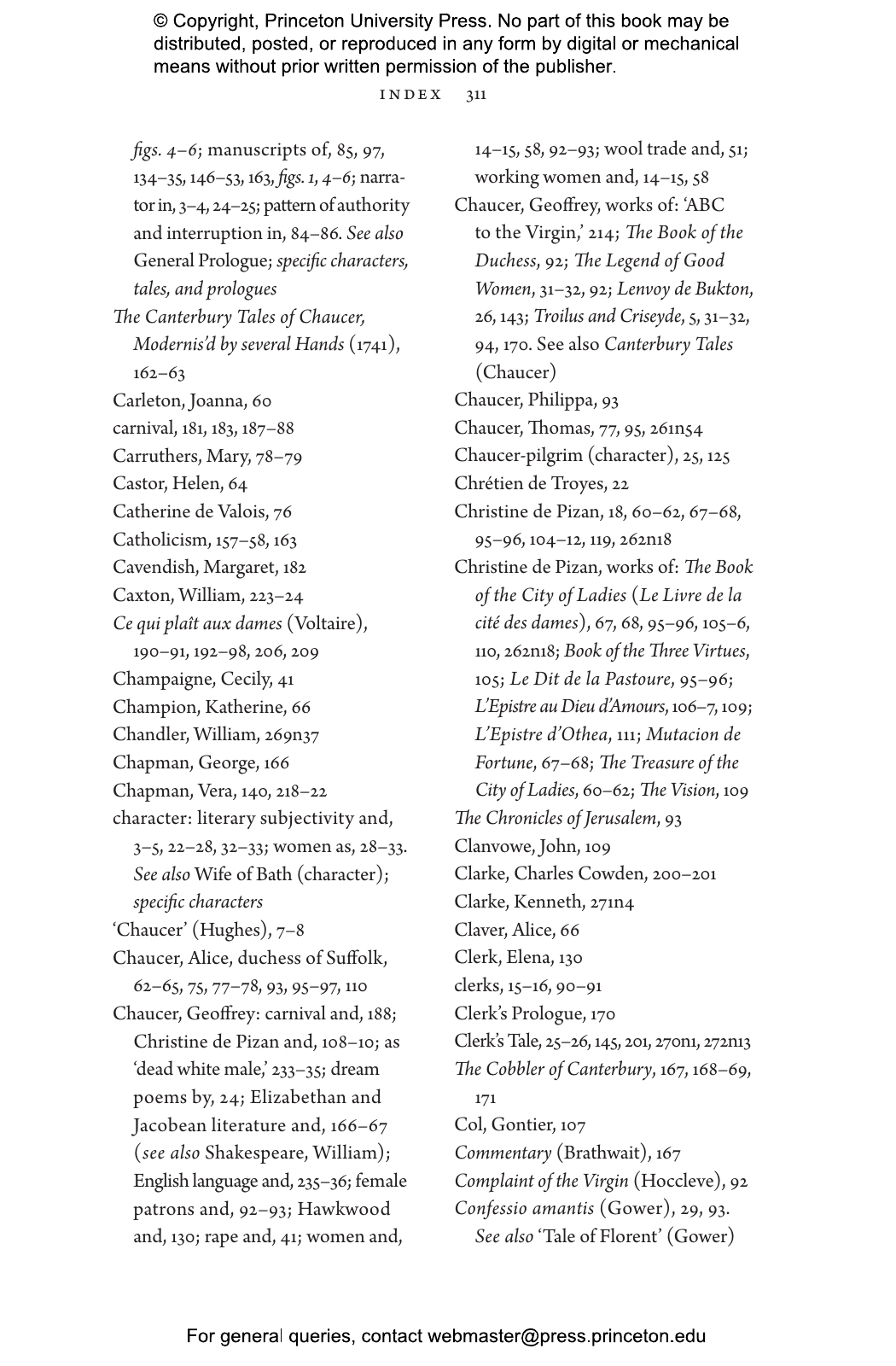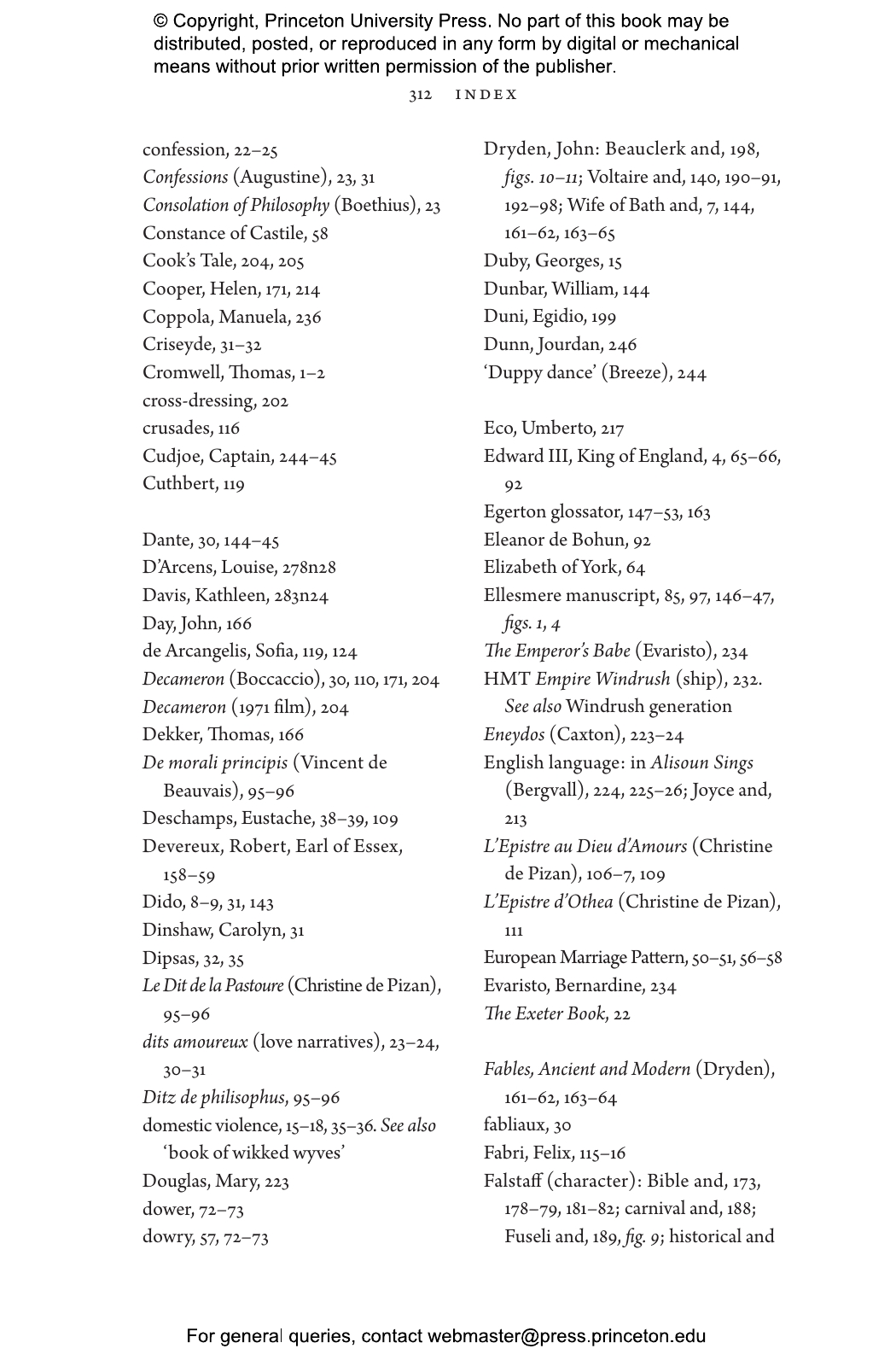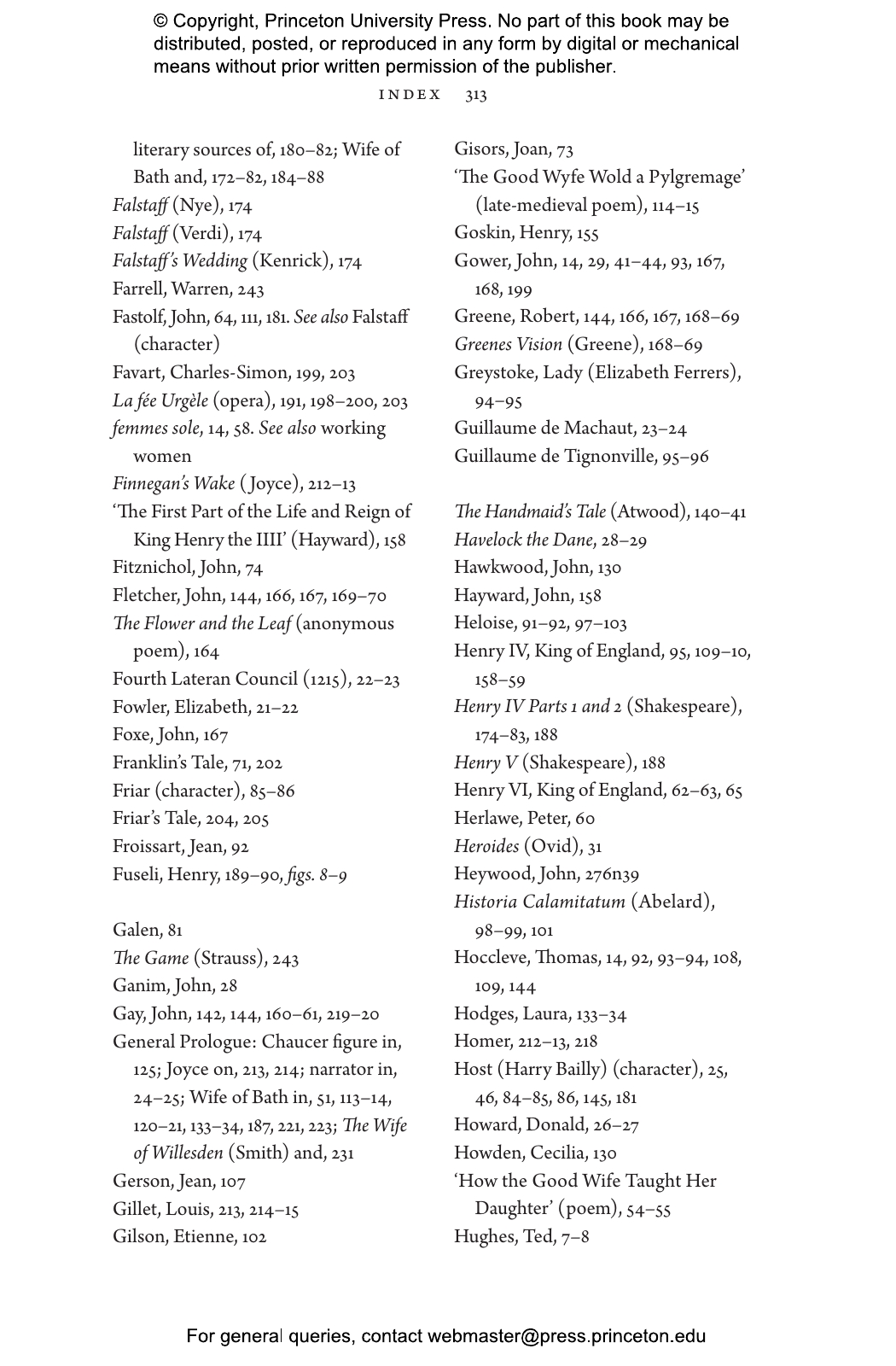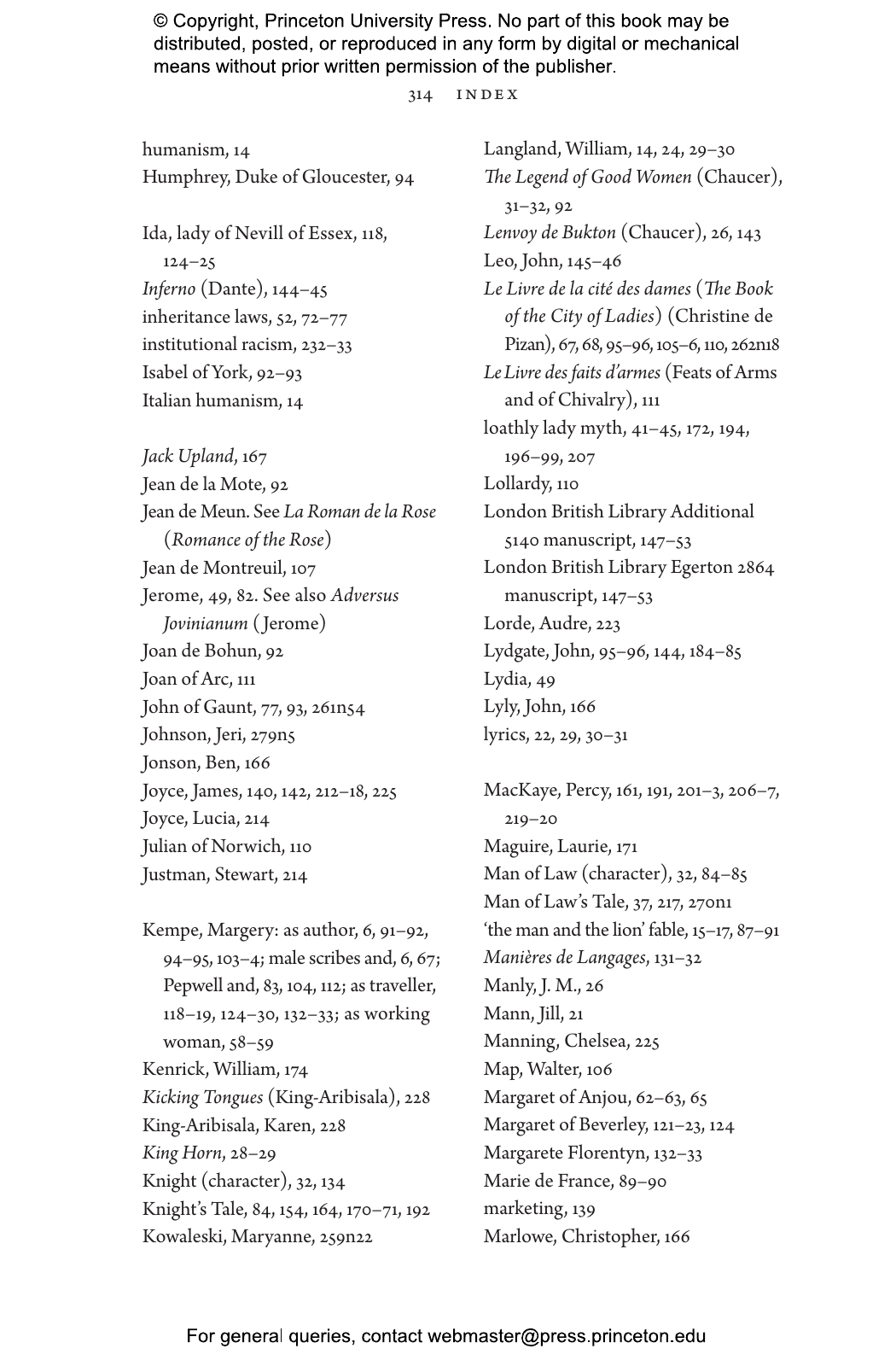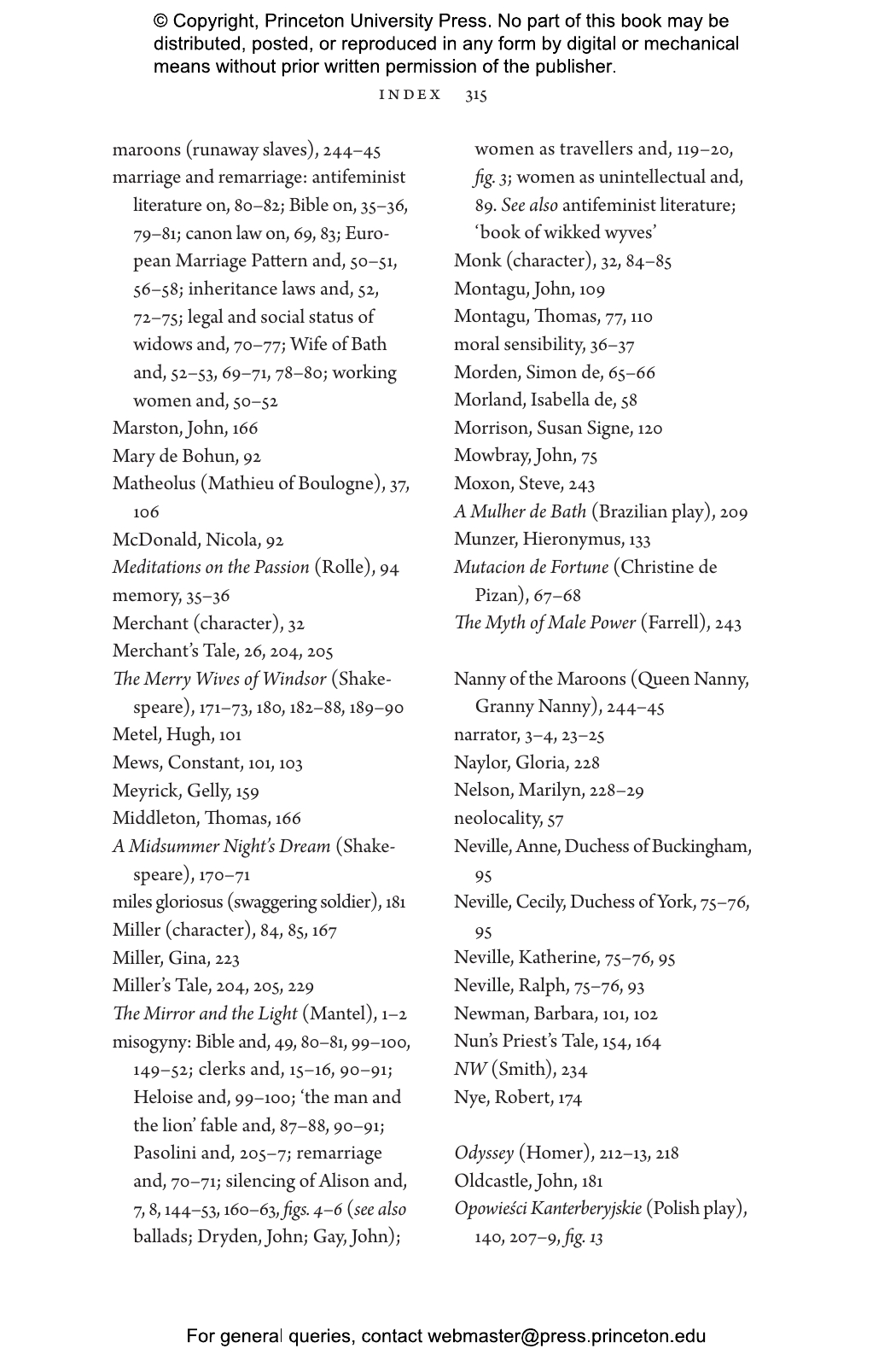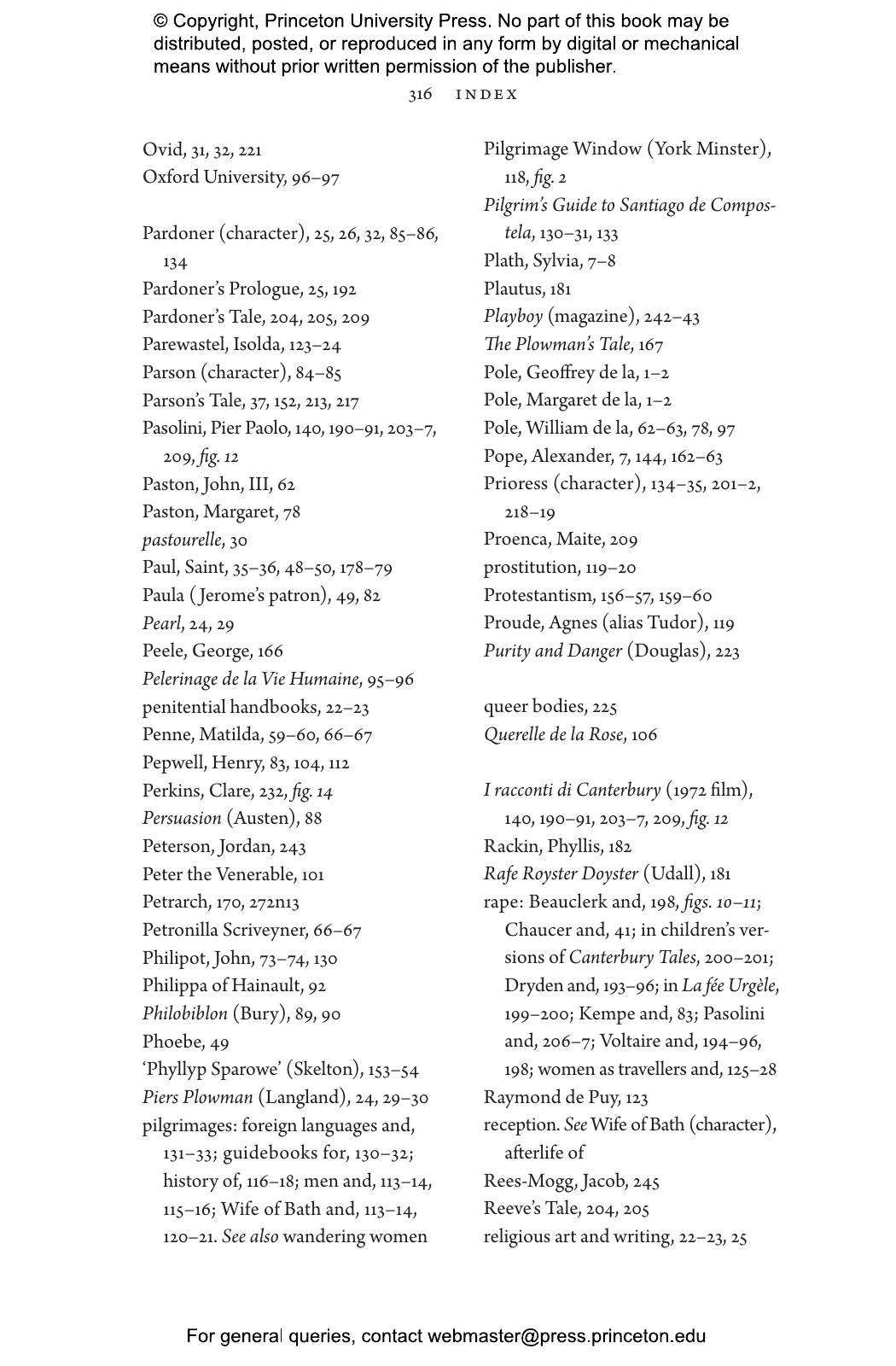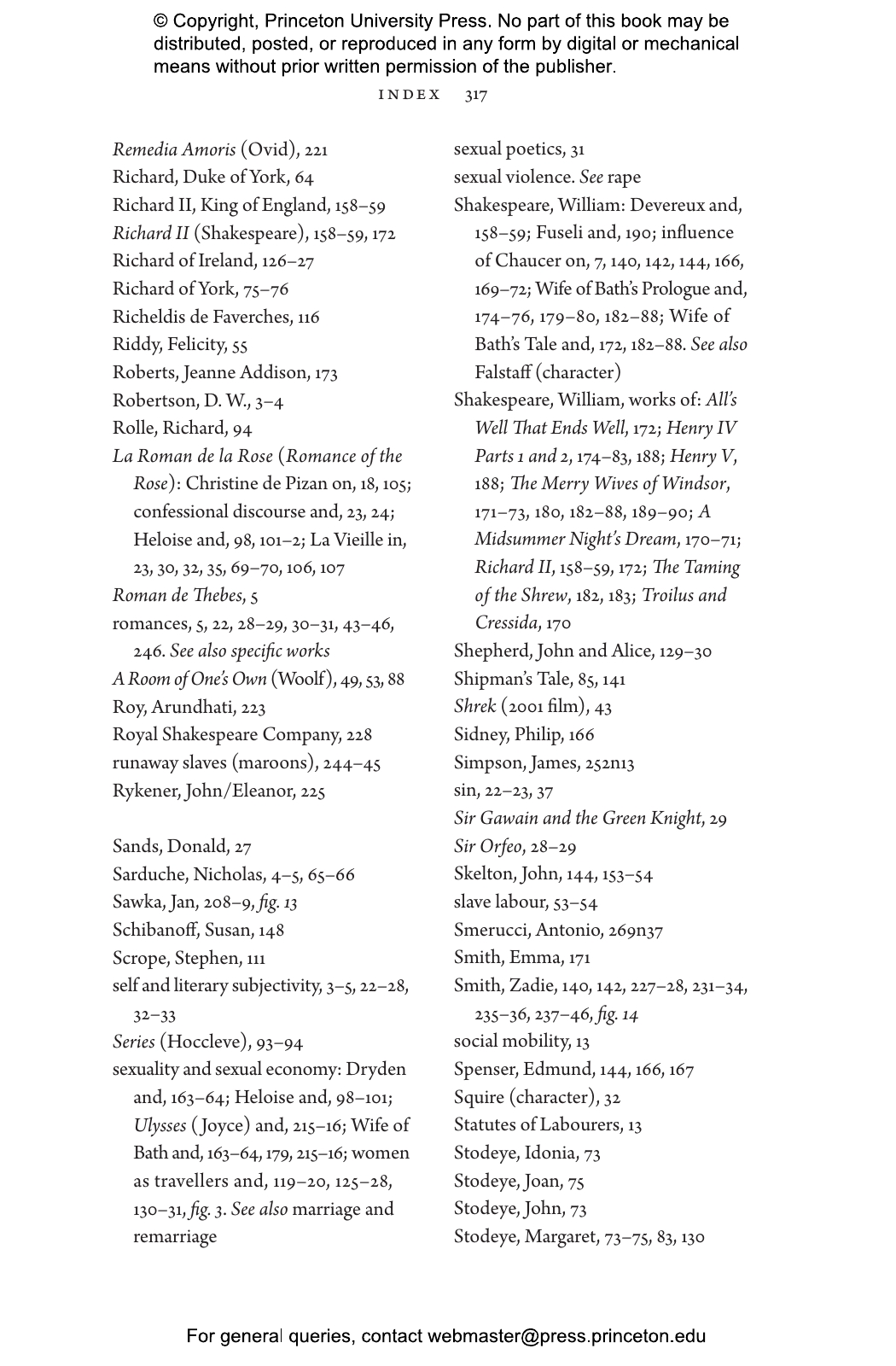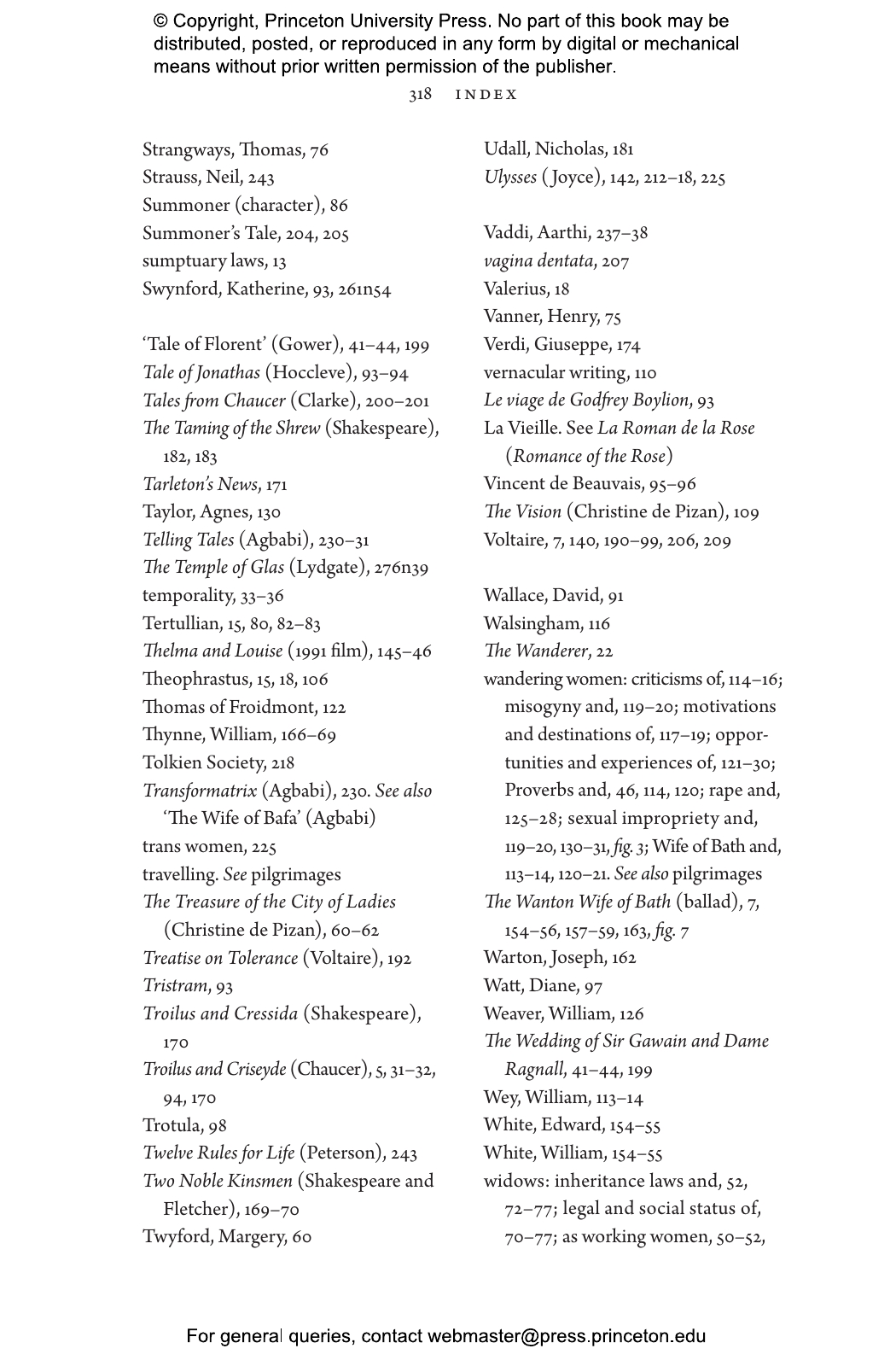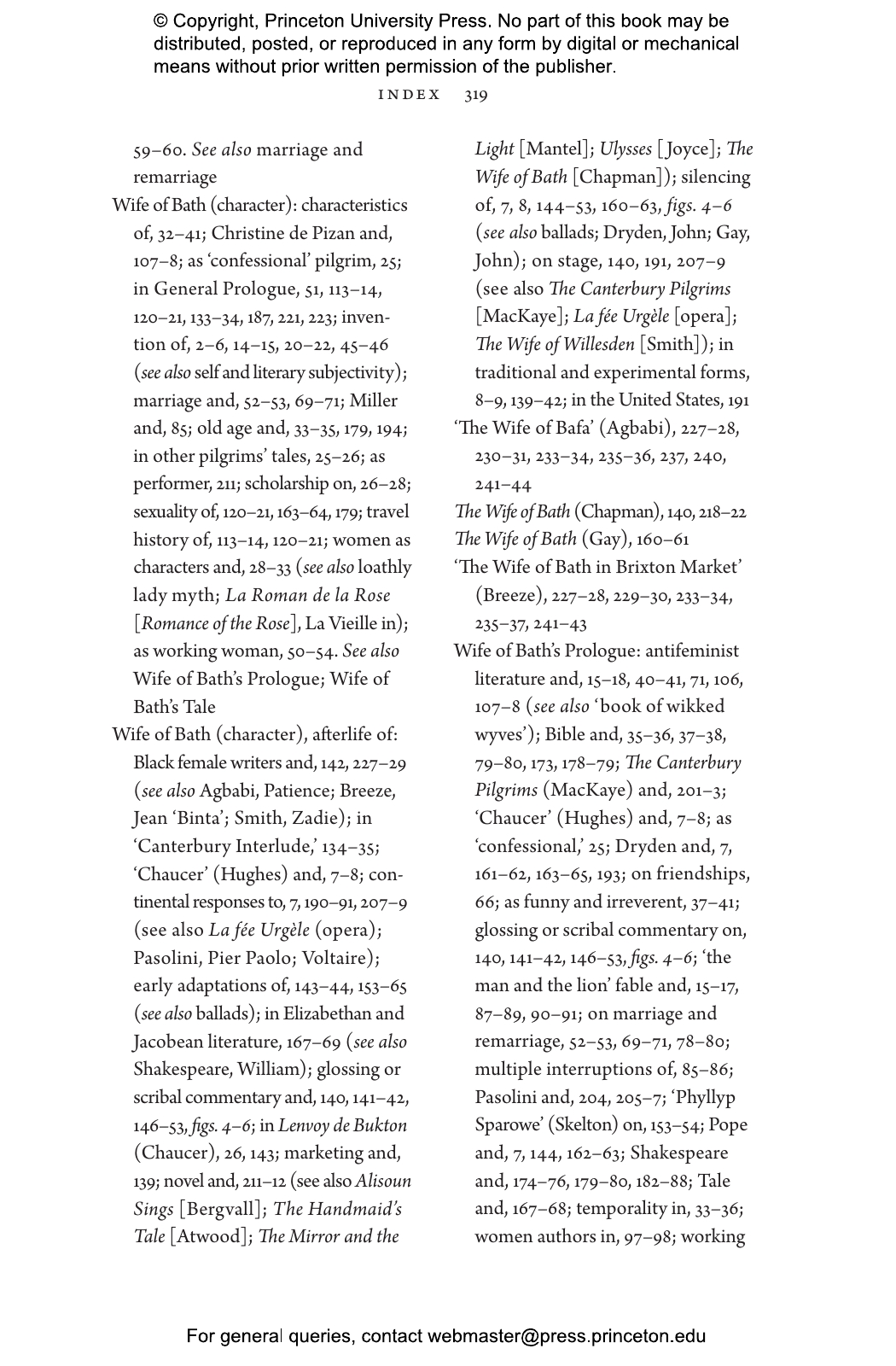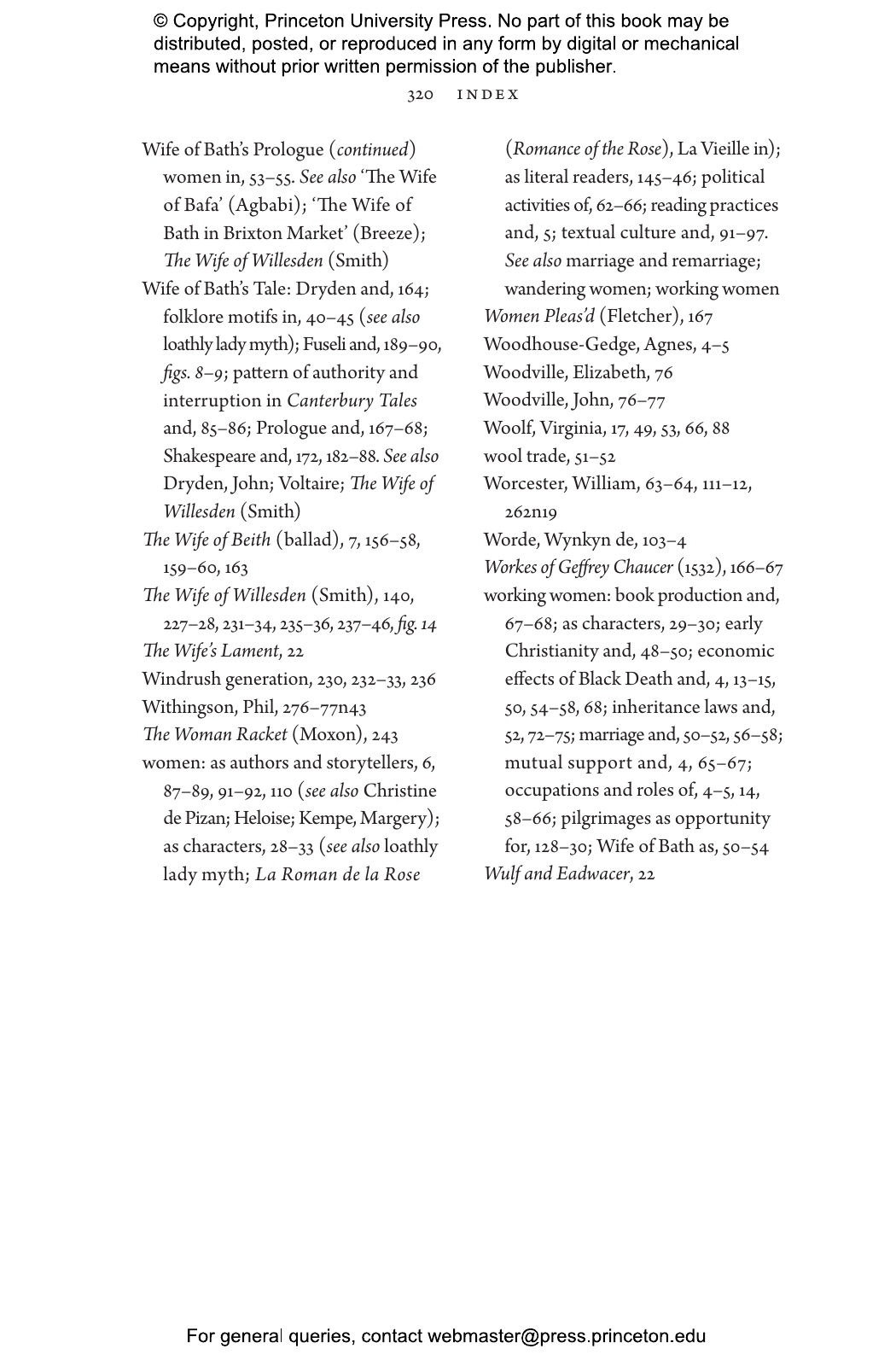Ever since her triumphant debut in Chaucer’s Canterbury Tales, the Wife of Bath, arguably the first ordinary and recognisably real woman in English literature, has obsessed readers—from Shakespeare to James Joyce, Voltaire to Pasolini, Dryden to Zadie Smith. Few literary characters have led such colourful lives or matched her influence or capacity for reinvention in poetry, drama, fiction, and film. In The Wife of Bath, Marion Turner tells the fascinating story of where Chaucer’s favourite character came from, how she related to real medieval women, and where her many travels have taken her since the fourteenth century, from Falstaff and Molly Bloom to #MeToo and Black Lives Matter.
A sexually active and funny working woman, the Wife of Bath, also known as Alison, talks explicitly about sexual pleasure. She is also a victim of domestic abuse who tells a story of rape and redemption. Formed from misogynist sources, she plays with stereotypes. Turner sets Alison’s fictional story alongside the lives of real medieval women—from a maid who travelled around Europe, abandoned her employer, and forged a new career in Rome to a duchess who married her fourth husband, a teenager, when she was sixty-five. Turner also tells the incredible story of Alison’s post-medieval life, from seventeenth-century ballads and Polish communist pop art to her reclamation by postcolonial Black British women writers.
Entertaining and enlightening, funny and provocative, The Wife of Bath is a one-of-a-kind history of a literary and feminist icon who continues to capture the imagination of readers.
Awards and Recognition
- A Financial Times Best Summer Book
- A New Yorker Best Book We've Read This Year
- Shortlisted for the History Book of the Year Prize, History Reclaimed
- Winner of the History Reclaimed Book of the Year Prize
- A BBC History Magazine Book of the Year
- A Choice Outstanding Academic Title of the Year
"The history of women in the Middle Ages is fraught with uncertainties, especially when it comes to source material and authorship; Turner unfurls this complexity in elegant, quietly angry prose, grounded in deep scholarly research. . . . Turner’s biography of Alison of Bath demonstrates the stunning resonance of medieval prejudice in the present."—Erin Maglaque, New York Times Book Review
"Those who foreground alternative voices must reach for innovative forms and reworkings of genre. Turner does this brilliantly, allowing Alison of Bath to speak for the legions of contemporary women otherwise silenced by history."—Daisy Hay, Financial Times
"Turner’s immensely entertaining ‘biography’ will make you fall in love with the Wife of Bath, whom she crowns ‘the first ordinary woman in English literature.’ . . . Wonderfully accessible and briskly entertaining."—Ron Charles, Washington Post
"Turner writes from a feminist perspective, but she is not a presentist—the kind of person who faults the past for failing to live up to the standards, or some people’s standards, of the present. . . . You are grateful for Turner’s thoroughness. She is especially adept at drawing meaning not only from characters’ similarities but also from their differences."—Joan Acocella, The New Yorker
"An intriguing combination of the fantastically bawdy and the deadly serious. . . . Thrilling."—Katy Guest, The Guardian
"A wonderful biography."—Mary Wellesley, The Telegraph
"This engrossing academic study helps you appreciate why, nearly eight centuries after Chaucer brought her to life, this funny, sexually confident middle-aged woman remains a titan of literature."—Martin Chilton, The Independent
"Erudite."—Susie Goldsbrough, The Times
"[A] thoroughly engaging book."—Mary C. Flannery, Times Literary Supplement
"[A] superb biography. . . . Turner's beautifully written, rewarding and thought-provoking book about this imaginary woman shows how much her literary existence has to say about actual women’s lives."—Gillian Kenny, The Spectator
"Turner’s scholarly yet lively portrait of [the Wife of Bath] reveals much about the real-life women who were the earliest readers of her tale, and about the cultures that have been captivated by her ever since."—Pippa Bailey, New Statesman
"[A] fascinating book."—The Week
"[A] lively biography."—Eleanor Parker, History Today
"This is a wonderfully witty, thoughtful and authoritative meditation on one of English literature’s most astonishing characters—a woman both ahead of her time and yet very much emblematic of the social changes under way in 14th-century England."—Carolyne Larrington, Literary Review
"Turner’s enthralling take on Chaucer is so rich, inspiring and relevant."—Lucasta Miller, The Critic
"[The Wife of Bath] finally gets the lively, full-length study she’s always deserved in Marion Turner’s new book. . . . It’s fun, thought-provoking popular scholarship at its best."—Steve Donoghue, Open Letters Review
"[A] passionate literary ‘biography’. . . . Turner’s prose is straightforward, artful, and occasionally biting. . . . Fans of Chaucer’s work and literature lovers more generally shouldn’t miss this."—Publishers Weekly
"A brilliant commentary on Chaucer’s ‘Alisoun’ and the posthumous relevance of Alison in our fractious world of gender politics."—Timothy Mowl, Country Life
"Written in elegant, accessible prose, The Wife of Bath reinvents literary criticism to tell the extraordinary story of one of English literature’s most memorable, norm-busting characters."—Foreword Reviews
"[A] superb exploration of the most memorable character in The Canterbury Tales."—Matt d’Ancona, Tortoise
"[Turner] writes in a companionable way that makes this a most engaging book."—Sean Sheehan, The Prisma
"Masterful. . . . An invaluable study not only for those who research and teach Chaucer and his Canterbury Tales but also for those who are engaged with women and gender studies from the Middle Ages to the present day."—Choice Reviews
"An illuminating social history. . . .Combin[ing] rigorous scholarship and an eye for entertaining detail."—Emily Brand, BBC History Magazine
"Lively, approachable, and exhaustively researched . . . [The Wife of Bath] has something to offer for both casual readers and scholars, particularly those working on gender, medieval studies, or adaptation studies, not to mention Chaucerians of all stripes. . . . An invaluable resource, not only for information on the Wife of Bath herself, but as a brilliant and well-considered example of the myriad possibilities available for approaching an old topic from a new angle."—Kristen Haas Curtis, Studies in the Age of Chaucer
"An intellectually daring study."—Terry Potter, Letterpress Project
"Turner presents a stunningly feminist account of all things Alison. Her style is simultaneously witty and informative, enabling her to recall centuries of critics, literature, and people whilst remaining vibrant and engaging."—Luisa Connors, Redbrick Culture
"Turner does an excellent job of delineating the ways in which the Wife of Bath is a distinctive and radical creation."—Cathy Hume, Spenser Review
“Marion Turner is a wonderful Chaucer scholar, able to convey the fascination of his works and world over the great distance of six hundred years.”—Zadie Smith
“A brilliant, learned, imaginative, and spellbinding improvisation on biographical narrative about ‘someone who never existed,’ but who changed the way we think about women in late-medieval England—and now.”—Hermione Lee, author of Tom Stoppard: A Life
“Geoffrey Chaucer’s Wife of Bath is one of the most famous and compelling characters in the whole of English literature. Marion Turner’s new study is the ‘biography’ she deserves. Deft, smart, and brilliantly readable, it explores the post-Black Death world that created Alison of Bath, and considers what she has come to represent in the six-and-a-half centuries since. This is a fine, elegant, and impassioned tribute to everyone’s favourite Canterbury pilgrim.”—Dan Jones, author of The Plantagenets and Powers & Thrones
“Great books break the rules in order to rewrite them. Marion Turner’s splendid The Wife of Bath breaks the rules of biography by writing about a fictional character. The book’s two halves, one about the ‘historical’ Wife of Bath, the other about her reception up to and into the current century, are equally vibrant and packed with novelties. The rules have been joyfully rewritten.”—James Simpson, Harvard University
